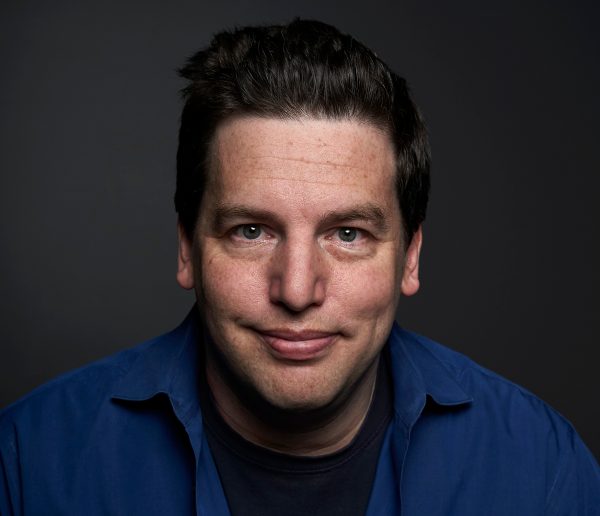Adam Chodikoff: “Since the last US elections importance of fact-checking has zoomed to its zenith.”
One of the speakers at the POINT 7.0 Conference will be Adam Chodikoff, a Senior Producer with “The Daily Show with Trevor Noah”. Adam has been working at The Daily Show for 22 years, which translates, as he said, into 22 years of friends, neighbours, and random passers-by asking him, “So wait, you’re not a writer? So what exactly do you do at the show?”

Adam usually replies by mumbling something about research and fact-checking, then slinks away. Hopefully, this lecture will allow him to elaborate a little bit more on his work.
His presentation, “The Daily Show – The Synthesis of Facts and Comedy”, is scheduled for Friday 18th of May at 10:30 AM. However, he found some time to answer on a couple of questions before he attends the conference.
- Why is fact-checking important today?
The obvious answer is that President Trump is unprecedented in his, shall we say, relationship with the truth. Fact checking was always important, but, since the election, its importance has zoomed to its zenith. What I want to guard against is the assumption that EVERYTHING that comes out of his mouth is wrong – when he’s right (or in the approximate ballpark), that should be acknowledged.
- Fact checkers are waging war on two fronts: assessing the truthfulness of statements by political actors, and especially lately, the fight against fake-news. These two are more than often intertwined? How do you deal with this in your daily work?
Whether it’s politicians or the media, I still use the same methodology – reliable, non-biased sources, peer-reviewed studies, government reports, Nexis, and let’s not forget – the Almanac.
- You have been working for The Daily Show for more than two decades now. You started long before social media. How did your work process evolved during that time, and what changed with the arrival of new technologies?
The work process is astonishingly not that different – I’ve had Nexis right from the beginning, and I still adhere to the same basic trusted sources. Tech advances have helped the show most in the physical procurement of video clips – not necessarily the research of finding the info on the clip, but being able to “grab” the clip quickly.
- Is it difficult to deal with, sometimes, very grim topics and, and find comedy in them?
That’s more of a writer’s question, but sure it’s tough – Trevor has excellent instincts, and he’ll pass on a topic if there’s no comedic value.
- US media have a 24 hours news cycle, how difficult is to monitor all of the media outlets? Do you work alone, or you have a team of people?
We have a whole video team – I watch all the boring stuff on CSPAN (hearings and debates), plus all five Sunday morning shows. The more policy-oriented, less sensationalistic stuff. Thanks to social media, there’s really no need to monitor 24/7 – if Wolf Blitzer drops his pants on air, the world will know instantaneously.
- What does your everyday work look like? Could you tell us a little bit about the process of preparing the material for the show? Do you have any specialized tools that you use?
I try to read as much as I can before the 9:40 am meeting with Trevor and the staff – I want to be prepared for any questions Trevor might have. The rest of the day is dealing with issues that come up- checking scripts, doing research for future pieces, answering any and all questions, preparing for a big guest interview, making sure our premises are sound. With the crazy news cycle, things can change in an instant. I stay at work until I get the final scripts before taping – sometimes we have to make changes close to the last minute.
- Do you participate in the process of writing the jokes with writing staff?
No, unless there’s a mass joke writing session near my desk – I might throw in an idea then, or submit a line to a writer later. I really have to pick my spots – remember, the writers are absolute geniuses and are at the top of their game – when I submit a joke, it’s sort of like auditioning for the Bolshoi Ballet with no dance experience!
- We couldn’t find you on any social networks. Is that by choice, or you go by pseudonym?
Yeah, I’m not a Luddite, but I’m not on any social networks. I might pitch a joke to the show Twitter account on a very very rare occasion. If I have some idea that I’m dying to share with the world, I’d rather pitch it for the show!
- We can see that US late night comedy has become very politically oriented. That type of comedy is gaining popularity globally. Do you think that people are more likely to understand politics when you break it down through satire?
Maybe – we want the audience to come into the show already having a basic understanding of the topic – that means Trevor can spend less time explaining/setting up, and get to the bulk of the story quicker.
- What do you expect from the POINT conference, and what can POINT audience expect from your lecture?
The address will cover the basics of my job – how research buttresses the show and enhances its credibility. Hopefully not as dry as that sounds.